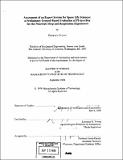Assessment of an expert system for space life sciences : a preliminary ground-based evaluation of PI-in-a-Box for the Neurolab Sleep and Respiration Experiment
Author(s)
Callini, Gianluca, 1976-
DownloadFull printable version (24.73Mb)
Alternative title
PI-in-a-Box
Advisor
Laurence R. Young.
Terms of use
Metadata
Show full item recordAbstract
Principal Investigator-in-a-Box (abbreviated [PI]) is an expert system designed to assist astronauts with the performance of an experiment outside their field of expertise when contact with the Principal Investigators on the ground is not allowed or impossible. The latest version of [PI] was designed to assist with the calibration and troubleshooting procedures of the Neurolab Sleep and Respiration Experiment, launched on the Space Shuttle Columbia on April 17, 1998. The role of [PI] in this application is to display physiological signals in real time during the pre-sleep instrumentation period, and to alert the astronauts when a poor signal quality (due to incorrect application of the instrumentation or a hardware malfunction) is detected. As the first expert system ever designed to be an integral part of a Space Life Sciences experiment, a formal and structured evaluation of the efficacy of such a system is unprecedented. The study presented in this thesis is a preliminary assessment of the efficacy of [PI] with the "poor signal quality detection" process. The twelve subjects used for this study were required to monitor a set of pre-recorded physiological signals and identify signal artifacts displayed on the screen. Every subject performed the experiment twice, once with the assistance of [PI] and once without, in a balanced design. Results indicated a positive effect of [PI] on overall time to detect anomalies. The combination of previous exposure to signal monitoring (training) and [PI] assistance was a significant factor in the improvement of overall reaction time. Also, the assistance of the expert system dramatically reduced the number of undetected anomalies. Having been designed for a life sciences experiment, the evaluation of [PI] was modeled after that of ground-based medical information systems. As for most medical expert systems, evaluation is an iterative process, and this study represents the first step, providing many insights and recommendations for more in-depth studies in the future, as well as exploring possible ramifications and expansions of the uses of expert systems in space.
Description
Thesis (S.M.)--Massachusetts Institute of Technology, Dept. of Aeronautics and Astronautics, 1998. Includes bibliographical references (p. 77-78).
Date issued
1998Department
Massachusetts Institute of Technology. Department of Aeronautics and AstronauticsPublisher
Massachusetts Institute of Technology
Keywords
Aeronautics and Astronautics